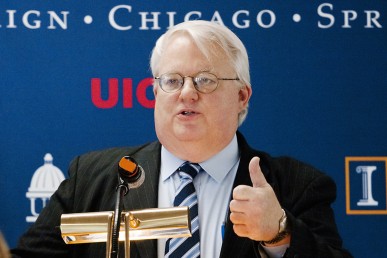University creates task force to promote open access
 The university has taken the first steps toward complying with a new state law that requires researchers at Illinois public universities to make their findings freely accessible online to the public.
The university has taken the first steps toward complying with a new state law that requires researchers at Illinois public universities to make their findings freely accessible online to the public.
At its Nov. 14 meeting at UIC, the Board of Trustees created a task force of faculty leaders from the three campuses to consider issues related to the law, which takes effect Jan. 1.
The task force, chaired by Urbana campus university librarian John Wilkin, has until Jan. 1, 2015, to report its findings to the trustees, the Illinois Board of Higher Education, the Illinois General Assembly and the governor.
Christophe Pierre, vice president for academic affairs, said the task force will discuss a “cluster of issues” related to open access before developing policy recommendations.
“The charge to the task force is to review current practices and design a proposed policy regarding open access to research articles, based upon criteria that are specific to university needs,” he said. “Our goal is to find the best way to meet those open access goals.”
The task force, which must meet publicly and is bound by the Illinois Open Meetings Act, will consider how to maximize the social and economic benefits of research to the public, increase the public impact of research and find ways to resolve restrictive publication agreements to make research materials publicly available.
UIC task force members include Mary Case, university librarian; Danilo Erricolo, professor of electrical and computer engineering; Anna Lysakowski, professor of anatomy and cell biology; and Mitra Dutta, vice chancellor for research.
Money issues
Financial pressures on the university continue to mount, with the latest threat coming in 2015 when bond-rating agencies begin to include state pension obligations in rate-setting formulas.

When bond-rating agencies include state pension obligations in rate-setting formulas, says UI chief financial officer Walter Knorr, “it will completely wipe out our (reported) assets.” Photo: L. Brian Stauffer/UI Urbana-Champaign
Chief financial officer Walter Knorr told trustees the new approach will hold the university accountable for the $8.3 billion in pension obligations accrued by the state, a move that could further erode the university’s credit rating on $1.7 billion in debt.
The university’s rating was downgraded in August but is still better than the state’s A3 rating, which is the lowest nationally.
“It will completely wipe out our (reported) assets,” Knorr said of the rating agency accounting change.
The university’s exposure in the risky health care field is a matter of concern, as well as the university’s dependence on the state to solve pension and other financial problems, Knorr said.
“Ultimately, (we) own that liability,” he said. “We’re going to be walking on eggshells until (the state) gets the pension issue solved.”
The university has considered a plan to take on some of the pension obligations now covered by the state as a way to ensure employee benefit stability. But doing so would mean an additional $19 million annual expenditure for every 1 percent of state pension costs shifted to the university.
A bright spot on the funding horizon came in a report from UI Foundation President Thomas Farrell, who talked about the organization’s restructuring efforts set to begin in 2015 and designed to double fundraising in the next seven to 10 years. The overall goal is $450 million.
He said the strategy involves making fundraising requests more specific to each donor and increasing philanthropic and large-gift donor sectors.
“We really are woefully behind when it comes to philanthropy and fundraising,” said trustee Pamela Strobel. “We’ve not had the structure, the system or the people in place.”
Farrell said a new information technology system “that can support our ambitions” would allow the foundation to effectively carry out its restructuring.
Academic business
After discussion in executive session, trustees concluded the high-profile disciplinary case of Louis Wozniak, Urbana-Champaign professor of engineering, by terminating his contract effective immediately.
The board issued a news release following the decision that said Wozniak, a tenured professor for more than 40 years, was removed “after finding clear and convincing evidence” he “can no longer relied on to perform his university duties and functions in a manner consonant with professional standards of competence and responsibility.”
Wozniak is accused of violating the privacy rights of students and repeatedly ignoring warnings to cease that conduct.
